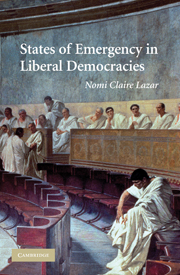Book contents
- Frontmatter
- Contents
- Acknowledgments
- States of Emergency in Liberal Democracies
- 1 The Problem of Emergency
- 2 Must Exceptionalism Prove the Rule?
- 3 Two Concepts of Liberalism
- 4 Are Rights Derogations Always Wrong?
- 5 The Rule of Law and the Roman Dictatorship
- 6 The Norms of Crisis Government
- Bibliography
- Index
3 - Two Concepts of Liberalism
Published online by Cambridge University Press: 15 September 2009
- Frontmatter
- Contents
- Acknowledgments
- States of Emergency in Liberal Democracies
- 1 The Problem of Emergency
- 2 Must Exceptionalism Prove the Rule?
- 3 Two Concepts of Liberalism
- 4 Are Rights Derogations Always Wrong?
- 5 The Rule of Law and the Roman Dictatorship
- 6 The Norms of Crisis Government
- Bibliography
- Index
Summary
I have suggested that the dilemma of emergency is two-pronged. Emergency at its most extreme threatens, on the one hand, the essence of liberal democracy, and on the other, its existence. If rights are derogated and powers concentrated, two essential features of liberalism are overcome. If not, the state or its citizens may succumb to crisis and chaos. In Chapter 2, I argued that those who see emergency powers as an exception from norms present an effective challenge to liberals along the second prong of the dilemma. Flexibility and force keep a state safe in times of emergency, but the checks and balances and rights guarantees of liberal government seem to preclude these. Diffuse power can prevent an efficient response even when a threat is immediate and deadly. But even with power concentrated, the constant and ubiquitous functioning of liberal norms means a liberal state would be constrained from confronting an emergency effectively. So, liberal states, on this understanding, would not survive the severest emergencies.
The solution that the exceptionalists propose, one that would exempt statesmen from accountability to liberal democratic norms and laws, is not one that we can accept. Political leaders cannot, it seems, be bound by norms, but they cannot make exceptions either. Hence, the problem of protecting the state and its citizens in a crisis remains a live one.
- Type
- Chapter
- Information
- States of Emergency in Liberal Democracies , pp. 52 - 80Publisher: Cambridge University PressPrint publication year: 2009



